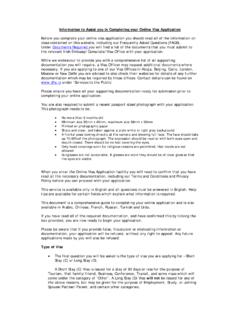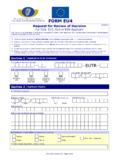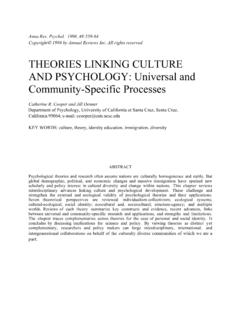Transcription of NEW IMMIGRATION REGIME FOR FULL TIME NON …
1 NEW IMMIGRATION REGIME FOR full time NON-EEA STUDENTS Final Report and Recommendations of the Interdepartmental Committee September 2010 Table of Contents Page Introduction and Scope of Report 2 Overview of the Consultation Process 6 Review of Consultation Process and Recommendations by the Committee Section A. General Structure and time Limits 8 Section B. Student work Concession 16 Section C. Accountancy Students 19 Section D. Inspection and Regulation 20 Section E. Access by Students and dependants to Services 24 Section F. Placement of Children not accompanied by Parents 26 Section G. Family Reunification 29 Section H. Work Placements and Internship 32 Section I.
2 Post Study Pathways and Integration with the Wider IMMIGRATION System 35 Section J. Visa Issues 39 Section K. Information 41 Appendices Appendix 1 - National Framework of Qualifications 42 Appendix 2 - Membership of Interdepartmental Committee on non-EEA Student IMMIGRATION 43 Appendix 3 - Practical Examples of the Transitional Arrangements 45 New IMMIGRATION REGIME For full time Non-EEA StudentsFinal Report & Recommendations of the Interdepartmental Committee1 Introduction The provision of educational services to overseas students is a vital sector of the economy, contributing not just in terms of the fees charged by universities and colleges but also in terms of accommodation, hosting services and living expenses while the student is in Ireland.
3 While no definitive data exists as to the overall annual economic value to Ireland of international education services, various sectoral estimates have been made and these, if accurate, would suggest a gross cumulative value of up to 1bn per annum1. Although this is a highly competitive market internationally, Ireland has the capacity to increase substantially its share of that market and the Government is committed to putting in place measures to bring this about. It should also be borne in mind that bringing overseas students to Ireland has other non monetary benefits in terms of cultural interaction and in creating connections with the Irish State around the world. Attracting the right international students assists in raising overall standards and the contribution of quality international scientists and researchers is a key driver of research and innovation in our educational institutions.
4 At the same time , IMMIGRATION policy makers cannot afford to be naive. Economic migration is a global phenomenon and by far the easiest way of moving legally from a developing country to live and work in a much wealthier society is as a student. Even minimum wage employment in Ireland provides a substantial multiple of the average earnings in many countries. Therefore legal residence status coupled with access to the labour market is of considerable economic value in itself, often exceeding that of the educational course. The impact of this factor on the market for international education should not be understated. Indeed virtually all of the IMMIGRATION abuse that is associated with student IMMIGRATION is driven by this factor, whether through the operation of disreputable colleges or the behaviour of students 1 A November 2007 report 'International Competitor Analysis and Benchmarking of Ireland s English language learning sector' prepared for F ilte Ireland by Indecon International Economic Consultants estimated the annual economic contribution of the English Language sector at 500m.
5 The International Education Board of Ireland 'International Students in Higher Education in Ireland 2009/2010' - Report of May 2010 estimated over 430m as the value of the higher education sector. No figures are available for further education but if the overall annual economic contribution from each full time student in that sector was 10k, this would bring the total estimate towards 1billion, (this is an estimate of all expenditure in total by non-EEA Students and is the subject of a multiplier) which may represent a peak value. New IMMIGRATION REGIME For full time Non-EEA StudentsFinal Report & Recommendations of the Interdepartmental Committee2who do not attend their classes. This phenomenon is not of course unique to Ireland.
6 On the contrary, other jurisdictions are constantly reviewing their student rules in response to IMMIGRATION abuse. Therefore any approach to reforming the student IMMIGRATION REGIME necessarily seeks a balance between the imperative of developing a vital services industry and the need to ensure that the wider IMMIGRATION system and labour market is not undermined. While abuses of the Irish system are confined to a small minority of colleges and it is important to reiterate this, there is nonetheless a clear need for reform of the regulatory environment. It is also widely acknowledged that a more co-ordinated and strategic approach is required. The Government has adopted a twin track approach on this matter.
7 Two complementary processes and accompanying structures have been put in place. The first of these is a reform of the student IMMIGRATION REGIME by the Department of Justice and Law Reform, taking into account the need to develop Ireland's international education industry, but in a manner that is consistent with IMMIGRATION policy generally and deals in an effective way with IMMIGRATION abuse. An Inter-Departmental Committee was established to oversee this process and this report is the outcome of their deliberations. The other pillar of the Government's approach is a series of measures announced by the Minister for Education and Skills including the establishment of a High Level Group on International Education to facilitate a more joined-up national approach to the promotion of Ireland as a centre of education for international students by both public and private sector stakeholders.
8 These other measures include; The amalgamated qualifications and quality assurance body will be given the role of regulating international education providers. In advance of its establishment, the National Qualifications Authority of Ireland (NQAI) has absorbed the Advisory Council for English Language Schools (ACELS), who are responsible for quality assurance in the English language sector, and has taken over the administration of the Internationalisation Register, the list of programmes whose students can avail of the work concession. New IMMIGRATION REGIME For full time Non-EEA StudentsFinal Report & Recommendations of the Interdepartmental Committee3 Enterprise Ireland will now take responsibility for marketing and promoting the 'Education Ireland' brand overseas and F ilte Ireland will continue to develop and promote the English language sector.
9 Creation of a 'Q Mark' which would be awarded to colleges complying with a statutory code of practice requiring, among other things, that all courses be quality-assured to a high standard; course entry requirements, including those relating to English language proficiency, be clearly stated; a high proportion of international students undertake exams and achieve awards within the advertised timeframe of courses; and the needs of international students be met including those relating to tuition fees, access to information and grievance procedures. Scope of the Report The new arrangements outlined in this document are confined to non-EEA students. EU/EEA students represent the majority of those coming for educational purposes but, since they have rights of free movement, no IMMIGRATION issues arise in these cases.
10 For the purposes of this document the relevant educational services are divided into three broad yet distinct groupings. Clearly there are different subgroups within these but for the present it is intended to deal broadly with the following:- (1) Higher Education (Universities, Institutes of technology and private higher education providers) offering validated courses at National Framework of Qualifications (NFQ) level 6 and above. (2) Further Education (For the purposes of this document, further education should be defined as programmes of education outside of the higher education sector, not including either English language courses or attendance at primary and post-primary school.)











